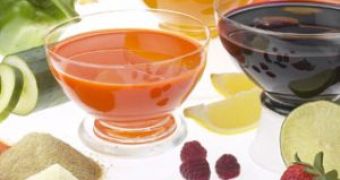A new research conducted by Qi Dai, M.D., Ph.D., assistant professor of Medicine and his colleagues found that people who consume three or more servings of vegetables and fruit juices weekly are up to 76% more likely to keep off developing Alzheimer's disease than those who drink natural juices less than once a week. The findings of the study are due to be published in the September issue of the American Journal of Medicine.
The study is entitled the Kame Project and scientists involved in the research have investigated the diets of 1,836 Seattle dwellers who did not suffer from any form of mental disorder. Results showed that fruits and vegetable juices have a very beneficial effect upon their mental health, because those who drank 3 or more glasses of natural juices weekly reduced their chances of getting to suffer from Alzheimer's or dementia later in life by up to 76%. On the other hand, individuals who reported they consume less than a serving of fruit and vegetable juice per week were highly more likely to develop the degenerative mental condition.
In the first stage of the study, the team thought that the antioxidant vitamins (vitamin C, E and betacarotene), extensively present in fruits and vegetables, are responsible for keeping Alzheimer's at distance. But as the study progressed, researchers proved to be wrong and shifted their attention from antioxidant vitamins towards polyphenols, other very beneficial chemicals naturally occurring in plants. Polyphenols are also very potent antioxidants which prevent the damage made by free-radicals to cells in our bodies.
"We thought that the underlying component may not be vitamins, that there was maybe something else. Also, animal studies and cell culture studies confirmed that some polyphenols from juices showed a stronger neuroprotective effect than antioxidant vitamins. So we are now looking at polyphenols. We don't know if it is a specific type of juice (that reduces risk). That information was not collected in the current study. But we can use plasma to narrow down the kinds of juices," stated Dr. Dai.
"A few years ago, hormone replacement therapy, NSAIDs (nonsteroidal anti-inflammatory drugs) and antioxidant vitamins showed promise (in preventing or slowing Alzheimer's disease), but recent clinical trials indicate that they do not. More study, I think, is needed," he concluded.

 14 DAY TRIAL //
14 DAY TRIAL //